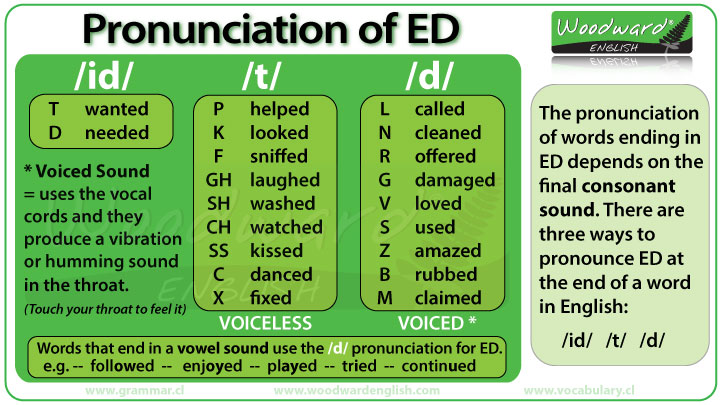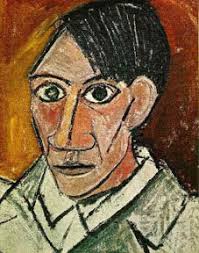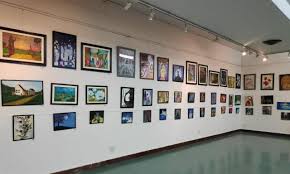
 Listen & Read: p.82
Listen & Read: p.82  entertainer: someone whose job is to entertain people by singing, telling jokes, etc.
entertainer: someone whose job is to entertain people by singing, telling jokes, etc. admit: to allow someone to enter a place.
admit: to allow someone to enter a place. destitute: without money, food, a home, or possessions. (synonyms: indigent= very poor)
destitute: without money, food, a home, or possessions. (synonyms: indigent= very poor) Grammar Practice: p.82
Grammar Practice: p.82
I, he, she, it – was
You, we, they – were
For first person singular and third person singular, use the word was. In all other cases, use were.
She was at home yesterday morning.
They were absent last week.
Asking question with the verb “to be” in past:
In order to ask a question, we need to use inversion of subject and to be (was/were): was/were+subject...?
In order to ask a question, we need to use inversion of subject and to be (was/were): was/were+subject...?
Was she at home yesterday?
Were they absent last week?
Using the negative form of “to be” in past simple:
In negative sentences, add the adverb not and put it after was/were.
Remember that most of the time the contraction (shortened form) is used in negative sentences: wasn’t = was not/weren’t = were not.
He wasn’t at the cinema with us last week.
We weren’t at home the previous Sunday.
I wasn’t hungry this morning.
We weren’t at home the previous Sunday.
I wasn’t hungry this morning.
Common words used to talk about the past: Yesterday- the day before yesterday= two days before- Last Sunday/ week /year...- 1 hour/5 days/3 months ago- When I was a child… / When we were in college…- in+year: in 2020/1999...
 Listening: p.83
Listening: p.83Conversation 1:
Conversation 2:
Conversation 3:
Conversation 4:
 Communication: p.83 Talking about past events:
Communication: p.83 Talking about past events:|
Talking
about past events (to be) |
|
|
When
was …born? Where
were….born? |
Who
was …? What
were…? |
Conversation 1
Man: How was the movie?
Woman: It was really good.
Man: Was it scary?
Woman: Yes, it was really scary.
Man: Nice. Was it crowded?
Woman: No, it wasn’t. There weren’t many people there, suprisingly.
Conversation 2
Man: Where were you last night?
Woman: I was at work.
Man: Really? I was at your shop. You weren’t there.
Woman: No, I was in the back working.
Man: You were?
Woman: Really! I was there.
 Reading: p.84
Reading: p.84 portrait: a painting, drawing or photograph of a person, especially of the head anad shoulders.
portrait: a painting, drawing or photograph of a person, especially of the head anad shoulders. impress: if a person or thing impresses you, you feel admiration for them or it.
impress: if a person or thing impresses you, you feel admiration for them or it. antomy: the scientific study of the structure of human or animal bodies.
antomy: the scientific study of the structure of human or animal bodies. astronomy: the scientific study of the sun, moon, stars, planets, etc.
astronomy: the scientific study of the sun, moon, stars, planets, etc. botany: the scientific study of plants and their structure.
botany: the scientific study of plants and their structure. geology: the scientific study of the earth, including the origin and history of the rocks and soil of which the earth is made.
geology: the scientific study of the earth, including the origin and history of the rocks and soil of which the earth is made. geometry: the branch of mathematics that deals with the measurements and relationships of lines, angles, surfaces and solids.
geometry: the branch of mathematics that deals with the measurements and relationships of lines, angles, surfaces and solids. optics: the scientific study of sight and light.
optics: the scientific study of sight and light. the Madonna: the Virgin Mary, mother of Jesus Christ. (late 16th century, used as a respectful form of address to an Italian woman): Italian, from ma (old form of mia "my")+donna "lady (from Latin domina).
the Madonna: the Virgin Mary, mother of Jesus Christ. (late 16th century, used as a respectful form of address to an Italian woman): Italian, from ma (old form of mia "my")+donna "lady (from Latin domina). Word Net: p.84 word formation:
Word Net: p.84 word formation:|
Verb |
Noun |
Adjective |
Adverb |
|
succeed |
success |
successful |
successfully |
|
act |
action/acting/actor/actress |
active |
actively |
|
sing |
song/singer |
ᴓ |
ᴓ |
|
ᴓ |
music |
musical |
musically |
|
paint |
painter/painting |
painted |
ᴓ |
|
design |
design/designer |
designed/designer/designing |
ᴓ |
|
create |
creation/creator/creative/creativity creature/creationism/creationist |
creative/ creationist |
creatively |
|
inspire |
inspiration |
inspired/inspiring |
ᴓ |
|
imagine |
imagination |
imaginative/imaginary |
imaginatively |
 designer: (adjective) expensive and having a famous brand name.
designer: (adjective) expensive and having a famous brand name. creative: (noun) a person who is creative.
creative: (noun) a person who is creative. creationism: the belief that the universe was made by God.
creationism: the belief that the universe was made by God. creationist: (noun) a person who belives that the universe was made by God.
creationist: (noun) a person who belives that the universe was made by God. creationist: (adjective) believing in or connected with creationism.
creationist: (adjective) believing in or connected with creationism. imaginary: (adjective) existing only in your mind or imagination.
imaginary: (adjective) existing only in your mind or imagination. imaginative: (adjective) having or showing new and exciting ideas.
imaginative: (adjective) having or showing new and exciting ideas. Writing: p.84
Writing: p.84Favourite artist:
Cat Stevens was born Steven Demetre Georgiou; since 1978 he has been known as Yusuf Islam. He was born in London in July 1948. His father was a Greek Cypriot and his mother was Swedish. In the 1990s Yusuf also began producing educational recordings on his own label, Mountain of Light, beginning in 1995 with The Life of the Last Prophet. From 2000 he concentrated on albums for a younger audience and produced some of the most popular CDs for children in the Muslim world including A is for Allah and I Look I See. One of his famous song is Father and Son. I like his songs because of the beauty of his music which is gentle, smooth and melodious, and of course the lyrics which are meaningful and thoughtful.
 Culture Slot: p.84
Culture Slot: p.84 percussion: musicl instruments that you play by hitting them with your hand or with a stick, for example drums.
percussion: musicl instruments that you play by hitting them with your hand or with a stick, for example drums. entrance: (verb) make somebody feel great pleasure and admiration so that they give somebody/something all their intention.
entrance: (verb) make somebody feel great pleasure and admiration so that they give somebody/something all their intention. entrancing: (adjective) making somebody feel great pleasure and admiration so that they give all their attention to them/it. (=خلاب)
entrancing: (adjective) making somebody feel great pleasure and admiration so that they give all their attention to them/it. (=خلاب) castanets (see the photo below)
castanets (see the photo below)
 Listen and Read (Pronunciation Practice) p. 85
Listen and Read (Pronunciation Practice) p. 85What did you do last Sunday?
Tony:
I stayed at home all day. In the morning I cleaned my room and revised my lessons. In the afternoon, I watched classical music on TV. In the evening, I surfed the Internet.
Bob:
We visited my grandparents. My grandmother cooked a big dinner. We listened to music and laughed a lot. I played some cards with my cousins.
Meg:
I stayed at home and helped my father. We worked in the garden. My father painted the gate and we planted some flowers. My mother prepared lunch. After lunch, we relaxed.

 Grammar Practice: Simple Past (Regular Verbs)
Grammar Practice: Simple Past (Regular Verbs) Affirmative: Verb+ed/d when the verbs finishes with an -e: watched- stopped- dropped- listened- painted...
Affirmative: Verb+ed/d when the verbs finishes with an -e: watched- stopped- dropped- listened- painted...N.B. Students should pay attention to double consonants when the verb is short: 1 vowel+1 consonant: 2 consonants.
 Negative: did+not+ verb (infinitive): didn't+verb
Negative: did+not+ verb (infinitive): didn't+verb watched: did not watch/ didn't watch
stopped: did not stop/ didn't stop...
 Interrogative:
Interrogative:  yes/no questions: did+subject+verb (infinitive)?
yes/no questions: did+subject+verb (infinitive)?Did you listen to music yesterday?
Did your father repair the car last week?
 Wh questions: Wh+did+subject+verb (infinitive)?
Wh questions: Wh+did+subject+verb (infinitive)?A: Where did they travel last summer holiday?
B: They travelled to Agadir.
A:Who did you visit last week?
B: We visited our grandparents.
 Pronunciation:
Pronunciation: 
 For further details check the following site:
For further details check the following site:  Adverbials/Time expressions:
Adverbials/Time expressions:  yesterday
yesterday the day before yesterday=two days before
the day before yesterday=two days before ...+ago (two days ago; ten years ago;...)
...+ago (two days ago; ten years ago;...) last+.... (last week; last month;...)= the previous+...
last+.... (last week; last month;...)= the previous+... In+year/month (In 1999; In September;...)
In+year/month (In 1999; In September;...) When I was..... (When I was a child...; When we were in Ifrane;...)
When I was..... (When I was a child...; When we were in Ifrane;...) Listening: p. 86
Listening: p. 86 Communication: p. 86 Example:
Communication: p. 86 Example:Jake: Hi, Laura. Did you have a good weekend?
Laura: It was OK. I bought a new game. I played it all weekend.
Jake: You played a video game all weekend?
Laura: Yeah. What about you? What did you do?
Jake: We went to the match on Saturday.
Laura: That's cool. Was it good?
Jake: Yeah. Why don't you come with us next time?
Laura: OK. Why not? Did you do anything else?
Jake: We had a barbecue on Sunday.
Laura: How was it?
Jake: It was terrible. It rained heavily!

 Reading: pp. 86-87
Reading: pp. 86-87Sculpture


Ceramics

Guernica

Cubism art (Pablo Picasso)

An art dealer is a person or company that buys and sells works of art.
Impressionism art

 Writing sample: p. 87
Writing sample: p. 87
Louis Pasteur (December 27, 1822 – September 28, 1895) was a French microbiologist and chemist.[1] He and his wife, Marie, are best known for their experiments supporting the germ theory of disease, and he is also known for his vaccinations, most notably the first vaccine against rabies. He made many discoveries in the field of chemistry, including the asymmetry (different shapes) of crystals. He is also well known for his way of keeping milk and wine from going sour for longer periods of time. That process is called pasteurization. It is when the milk and or wine is put under about 161 Fahrenheit (72 Celsius) for fifteen seconds.
Pasteur's later work on diseases included work on chicken cholera. During this work, Pasteur noticed how a culture of the responsible bacteria had spoiled, and it failed to induce the disease in some chickens, which he was infecting, with the disease.
Reference: https://simple.wikipedia.org/wiki/Louis_Pasteur

 Listen and Read: p. 88
Listen and Read: p. 88
 day off: a day when you do not work.
day off: a day when you do not work.
 downtown: in or to the central part of a city.
downtown: in or to the central part of a city.





 Writing sample: p. 87
Writing sample: p. 87Louis Pasteur (December 27, 1822 – September 28, 1895) was a French microbiologist and chemist.[1] He and his wife, Marie, are best known for their experiments supporting the germ theory of disease, and he is also known for his vaccinations, most notably the first vaccine against rabies. He made many discoveries in the field of chemistry, including the asymmetry (different shapes) of crystals. He is also well known for his way of keeping milk and wine from going sour for longer periods of time. That process is called pasteurization. It is when the milk and or wine is put under about 161 Fahrenheit (72 Celsius) for fifteen seconds.
Pasteur's later work on diseases included work on chicken cholera. During this work, Pasteur noticed how a culture of the responsible bacteria had spoiled, and it failed to induce the disease in some chickens, which he was infecting, with the disease.
Reference: https://simple.wikipedia.org/wiki/Louis_Pasteur

 Listen and Read: p. 88
Listen and Read: p. 88 day off: a day when you do not work.
day off: a day when you do not work. downtown: in or to the central part of a city.
downtown: in or to the central part of a city.Her car broke down yesterday.
An art exhibition
They are rushing to work.

A violin

 Grammar Practice: p. 88
Grammar Practice: p. 88
 Listening: p. 89
Listening: p. 89
 Reading: p. 90
Reading: p. 90Short biography of Um Kalthum:
Oum Kalthoum (Arabic: أم كلثوم, other English spellings include: Umm Kulthum, Om Kalthoum, Oum Kalsoum, Oum Kalthum, Omm Kolsoum, Umm Kolthoum, Um Kalthoom) (1904–1975) was an Egyptian singer and musician.
Oum Kalthoum was born in Tamay ez-Zahayra village in El Senbellawein, Dakahlia Governorate, Egypt. Her birth date is controversial, either 31 December 1898, 31 December 1904 or 4 May, 1904. She died on 3rd February, 1975.
Reference: https://www.last.fm/music/Oum+Kalthoum/+wiki
 immensely: extremely; very. (synonyms: enormously;hugely;vastly)
immensely: extremely; very. (synonyms: enormously;hugely;vastly) earn: to receive money as payment for work that you do.
earn: to receive money as payment for work that you do. to tour: to go on a tour somewhere.
to tour: to go on a tour somewhere. establish yourself: to be in a successful position over a long period of time. (Example: He has established himself as the leading candidate in the election.)
establish yourself: to be in a successful position over a long period of time. (Example: He has established himself as the leading candidate in the election.) main: larger, more important, or having more influence than others of the same type.
main: larger, more important, or having more influence than others of the same type. powerful: having a lot of strength or force.
powerful: having a lot of strength or force.funeral